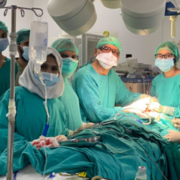Oral and Maxillofacial Surgery Medical Missions: A Noble Cause

Six thousand seven hundred and eighty-three; the number of miles from Lahore, Pakistan, to Winnipeg, Manitoba. It’s the journey I took in September of 2009 to embark on a new challenge in my professional career as an OMFS. Accompanying me was a wide and diverse repertoire of clinical and surgical skills gained, accumulated, and refined over the course of twenty years, catering to a diverse population in a country habitant to 231 million people. There was a promise that these fine motor movements ingrained as muscle memory would be applicable in an entirely different patient population. Still, there was also a hint of uncertainty regarding that sentiment. Over the 13 years I have been here, I had not anticipated how many times I would trace back those 6,783 miles in the form of mission trips.
Hence, when I was asked by my friend and colleague Dr. Bruce Pynn to write an editorial for Oral Health, I thought of Medical Missions to impoverished communities and countries. Medical missions, historically, have been riddled with a saviour mentality which in no way is an accurate description of these enlightening trips. Medical missions to these communities offer reciprocity of benefits between visiting healthcare providers, local healthcare providers and patients. Our specialty of Oral and Maxillofacial Surgery is unique in its scope and continues to expand its boundaries in an impactful way. However, it is underrepresented and undervalued in many developing countries of the world. This state of affairs, along with poor healthcare infrastructure and constrained financial resources, leads to less desirable treatment outcomes and poor surgical results.
Medical missions provide local patients with an opportunity to get access to some of the best evidence-based medical and surgical treatments putting to use state-of-the-art materials, virtual surgical planning, and patient-specific implants.

Simultaneously, local healthcare providers at all education levels, including attendings, residents and support staff, learn through mutual interactions, teamwork, and actively participating in the procedures and pre- and post-operative care. This brings about a meaningful change in the approach, thought process, and ability of the hosts to deliver OMFS-specific complex procedures utilizing newer and current techniques.
Through my interactions, I can confidently testify that local healthcare staff certainly do not embody any dearth of talent or lack of desire to excel but rather have the thirst and zeal to acquire knowledge. Pivotal to the promotion of education is the continuous exposure to teaching and training at various tiers of health care. This process also ensures that instruction is provided and received by a larger group of professionals rather than the respective governments with their limited health care budgets sending one or two personnel abroad for training.
Importantly, medical missions prove to be equally beneficial to the visiting providers. It helps them expand the horizons of their profession beyond its borders. It brings about creative and innovative techniques to treat a diverse array of surgical and medical challenges. It creates opportunities for young surgeons and residents to operate with hands-on experience in very different, resource-limited, and often suboptimal operating conditions. Last and certainly not least, it acquaints us with different cultures, perspectives and how it all is intertwined within medical philosophy. The crux of being a medical professional is weaved within humanitarianism and the act of giving back and being of service, which can be perfectly exemplified by mission trips.
Canadian Oral and Maxillofacial Surgeons are doing extraordinary work by going above and beyond their role in an individual capacity to lead medical missions in different underprivileged parts of the world. This is an outstanding contribution to humanity and cannot be matched in any other way. The need is to prioritize and organize these missions on a platform by a central body like CAOMS. It will be meaningful and would cater to the specific OMFS needs of impoverished communities and regions. CAOMS can utilize its good offices to liaise with other sister professional OMFS associations around the developing world to promote this noble cause which is close to the heart of the Canadian OMFS fraternity.
About the Author

Dr. Adnan Shah is a professor of Oral and Maxillofacial Surgery at the University of Manitoba. He is the Department Head of Dental Diagnostics and Surgical Sciences and Program Director OMFS Residency Program. Dr. Shah also heads the Department of OMFS at Health Sciences Centre Hospital, which is a level-one trauma centre and maintains a private practice at Assiniboia Surgical Centre. His passion drives him to continue to lead medical mission trips to Pakistan.